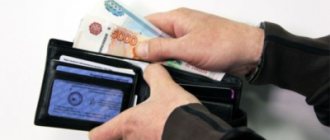Buying a new home is an expensive pleasure, so many families are forced to raise borrowed funds. Mortgage lending today is more profitable than conventional loans. At the same time, you can save additional money on it if you consider the option of purchasing an apartment on the secondary market. We will tell you in this article what pitfalls you may encounter when buying an apartment with a secondary mortgage and how to avoid them.
After the transaction was completed, the apartment began to look different
At the final stage before purchasing, you meet with the seller in your future apartment or house. Everything is fine, you are happy and looking forward to moving, imagine how beautifully you arrange the dishes in the kitchen and hang the curtains in the living room, and place the chair and lamp in a cozy corner next to the socket.
The deal goes through, you move into your new home and discover that all the sockets have been ripped out, the baseboards have been stripped, the wallpaper has been scratched, and all the beautiful cabinets and nightstands have been taken away. You see bare walls and understand that repairs and additional expenses await you.
How to prevent
The contract must additionally specify what remains untouched after the keys are handed over and the previous owners move out. For even greater reliability, you can attach photographs of the apartment to the document at the time when you made the decision to purchase and signed the papers with the seller. In this case, when you receive the keys and move into the apartment, there will be no surprises for you.
The final stage: registration of the agreement in Rosreestr, mutual settlements, tax deduction
At the end, the Buyer will need to contact Rosreestr with the main purchase and sale agreement and other documents that accompanied the transaction. Here the applicant pays a state fee of 2000 rubles . A regular apartment purchase and sale agreement is registered within 7 days, and an apartment purchase and sale agreement on a mortgage is registered within 5 days. If the contract was certified by a notary, then registration takes 3 days.
Usually, mutual settlements are carried out at the very last stage (however, you still need to build on the provisions of the previously concluded agreement). Payment can be in cash or non-cash . If the parties agreed to pay “cash”, they should:
- draw up a Receipt for the transfer and receipt of money (as in the case of an advance/deposit);
- The Buyer must take his witness to the meeting with the Seller.
When making cashless payments, it is not recommended to simply transfer money to the 2nd party. It is better to use a safe deposit box or letter of credit. This will allow the Buyer to put money in a special storage facility in advance and “freeze” it. The seller will have access to the funds immediately after completing all agreements and handing over the keys to the new owner.
Upon completion of the transaction, the Buyer can partially compensate for their expenses by receiving a property tax deduction . To do this, you will need to contact your local tax office. Only officially employed citizens can claim a tax deduction, from whose every salary personal income tax is regularly deducted to the state budget of the country.
A property tax deduction can be obtained in the following cases:
- The buyer bought the apartment directly from the owner.
- The buyer bought an apartment with a mortgage (there are even 2 deductions here - compensation for expenses for purchasing an apartment and compensation for mortgage interest).
And, conversely, a property tax deduction is not due in the following cases:
- The buyer bought the apartment from his close relative (parent, spouse, child, brother or sister).
- The buyer bought the apartment from his employer.
- The buyer used government subsidies (for example, maternity capital) to purchase the apartment.
The previous owner is in no hurry to check out
You bought an apartment and really want to complete the transaction and move to a new home as soon as possible. In addition to the seller, several other people are registered there, and the former owner does not have time to check everyone out of the apartment. You agree that they will be deregistered within a month. A month or two passes, people don’t check out, the seller doesn’t want to get in touch.
How to prevent
Before purchasing, it is best to wait for the complete legal release of the apartment. But if you are in a hurry, be sure to include in the purchase and sale agreement the deadlines for when everyone registered in the apartment will be deregistered.
If problems do arise, there is no need to be afraid: you can always write outsiders out through the court. Competent lawyers will help.
What should you not do when transferring money?
- Transfer money ahead of time. If you have not yet signed the purchase and sale agreement, and the seller is already asking you for money for some reason, do not agree. Otherwise, you may be left without an apartment and without money. Until your title is registered, you are not the real owner.
- Transfer money without documents. Don’t forget about the receipt and the purchase and sale agreement. These are important documents that will confirm that you definitely transferred the money. And if something happens, they will be useful to you in court. The same applies to prepayment. Do not transfer any advances without written confirmation. Otherwise you won't be able to prove anything.
- Giving money to the wrong person. This can happen if you don’t check the seller and give up on the documents. There is a risk of running into scammers who are selling other people's real estate. They can easily take advantage of your gullibility.
Therefore, check the documents before you are going to sign anything, much less transfer money. Look at the seller’s passport, check it with the papers for the apartment: a purchase and sale agreement or a certificate of inheritance , if he inherited the apartment from relatives. Also, review the title deed. This may be a paper certificate or an extract from the Unified State Register. Using it you can understand who the real owner is, study the real characteristics of the apartment and the presence of restrictions on housing.
To be sure, order a report based on the USRN extract from Rosreestr in advance and independently. Use the N.Reestr service . On the same day, you will receive in your email the most current and reliable data on the property you are planning to buy.
Text: Ksenia Chertova
After signing the contract and making an advance payment, the seller refuses to sell
The agony of choice is over: you have selected an apartment that suits all parameters, started preparing for the transaction, and submitted an application for mortgage approval on your own or through a realtor. And suddenly the owner says that he has changed his mind about selling the apartment. Or I found a buyer who is ready to purchase it on more favorable terms: for example, he pays in cash. The owner of the apartment returns the advance and literally slams the door in your face.
How to prevent
The advance agreement additionally stipulates that after receiving the deposit, the seller of the apartment guarantees that it is assigned to you, and in case of violation of the terms of the agreement, he not only returns the advance, but also pays you a penalty.
It is clear that situations can be different and it is impossible to provide for everything within the framework of the contract. But you will receive an additional guarantee of your seller’s integrity: few people will want to pay a penalty.
Advantages and disadvantages
Buying an apartment in a new building or at the construction stage is not always economically justified: the price per square meter is higher, the time frame for putting the house into operation is very conditional, and the opportunity to get a bank loan is not guaranteed. That is why in recent years the segment of secondary housing in the real estate market has grown significantly.
Buying an apartment with a mortgage: step-by-step instructions from an expert
The advantages of "secondary"
- price - for an old vest it is lower than for an apartment in a new building;
- the presence of developed infrastructure - schools, kindergartens, retail outlets, transport interchanges, etc.;
- the opportunity to move in immediately after purchase - in order for his offer to be competitive, the seller tries to make at least minimal cosmetic repairs. With some effort, there is a chance to find an apartment decorated in the latest fashion;
- the likelihood of getting a mortgage to purchase a secondary property is higher - banks are more favorable towards such applications due to the high liquidity of a finished apartment than to options for purchasing new buildings.
Disadvantages of buying second hand
- increased interest rate on a loan for the purchase of new housing;
- It is not always possible to find an apartment with the desired characteristics;
- the degree of wear may require additional investments for major repairs;
- risks associated with possible legal consequences from previous owners.
Nevertheless, buying an apartment on a secondary mortgage is invariably in demand: the main criterion is its more reasonable cost from an economic point of view.
The transaction is declared invalid due to the seller’s health problems
All stages of the transaction are completed, you move into a new house, settle down and find out that the transaction was invalid: the seller or one of the sellers (if there are several property owners) is limited by the Civil Code of the Russian Federation by a court decision Article 17. The legal capacity of a citizen is incapacitated due to a mental disorder. You can imagine what horror and problems await you after such news.
How to prevent
Even if the seller does not raise your suspicions, looks great and communicates adequately, be sure to request certificates from the psychoneurological (PND) and narcological dispensaries (ND). You may think that asking to see these kinds of documents is ugly or inconvenient, but these certificates are a standard request in real estate transactions. Remember that you first need to eliminate all personal risks, insure yourself and provide for everything.
Experts spoke about the pitfalls when buying a secondary home
Properties on the secondary housing market can have many pitfalls that are not so easy to recognize. Lawyers and realtors told Izvestia on Friday, July 9, how to identify risky transactions in the real estate market.
Fraud or mental problems?
All risky transactions in the housing market can be divided into three categories, said Stanislav Galkin, director of the real estate agency OBMENKVARTIR.RF.
The first category is openly fraudulent schemes, when the organizers of the transaction deliberately commit deception in order to obtain financial gain. For example, they involve people suffering from mental illness in the transaction and persuade them to sell their real estate. As a result, such a transaction is challenged on the basis that the seller did not and could not understand the consequences of his actions due to mental illness. The home is eventually returned to the seller, and most of the money remains with the scammers.
You can protect yourself from such actions only after a thorough check of documents, sellers and the history of the apartment.
Maternal capital
The second category of risky transactions are cases when the seller knows that there are factors that could lead to a challenge to the transaction, but for some reason hides them from the buyer, said Stanislav Galkin.
The family was convicted: the odious swindler received a substantial sentence
Black realtor Matthew Erman will go to a maximum security colony
For example, he sells an apartment for the purchase of which or for early repayment of the mortgage funds from maternity (family) capital were used. If the parents sold such an apartment without giving shares to their children, the transaction may subsequently be challenged by a statement from the competent authorities or even by a claim from the children who have grown up and learned that their rights were violated.
This also includes transactions for the sale of housing, during the privatization of which persons who have the legal right to do so were not granted ownership rights. Especially if the rights of persons who were minors at that time were violated.
If you see that the apartment was purchased through a paid transaction, especially with a mortgage loan, request a certificate stating that maternity capital funds were not used - even if the seller’s passport does not contain a record of the presence of children.
“We once had an interesting case when it turned out that the children were not indicated in the passport, but the maternity capital was used. If you have suspicions that at the time of purchasing the apartment the seller was married (for example, the purchase was old, but the passport is “fresh”), request a certificate from the registry office that the seller was not in a registered marriage at the time of purchase,” the realtor advised .
The most dangerous deals
The third category of dangerous transactions refers to cases where the parties did not know and could not know about the presence of factors that could subsequently lead to termination of the transaction. The most common category of such transactions is the sale of an apartment that was inherited, says Stanislav Galkin. When registering an inheritance, the interests of persons who are legally entitled to their share may not be taken into account, and it is not possible to find out their existence. For example, a man dies, his children enter into inheritance rights and sell the apartment. Then it turns out that the deceased had another child (or several children), the existence of which the family of the deceased, as well as the notary who formalized the inheritance, did not know and could not know. And these new heirs are challenging the deal.
This category also includes the consequences of the recently adopted law on bankruptcy of individuals. According to the law, you can challenge a real estate sale transaction, even if the sale took place three years before the start of bankruptcy proceedings. Sometimes in the history of an apartment there are factors that can subsequently lead to the termination of all subsequent transactions and the presence of which the parties were not aware of when making the transaction. For example, once upon a time an apartment was sold using forged documents or during its sale the interests of third parties were infringed. After even a very long time, such a transaction can be terminated, as well as all subsequent transactions. In such cases, it is quite difficult to protect the buyer from the risks of losing the apartment.
In cars in front of the MFC
When preparing a purchase and sale agreement, an important factor is the financial terms of the transaction, the form of payment and calculation of the cost of housing, the transfer of money, which is recommended to be done in official places, for example in banks, said Yulia Savinykh, Skolkovo resident, General Director of Inkom LLC, President of MTK LLC.
“You definitely shouldn’t do this in cars in front of the MFC, in apartments that are for sale and in dubious offices of real estate agencies. Be sure to check all the powers of the director of the company, employees must have a power of attorney, the length of service of the company, the actual and legal addresses of registration of the company are important,” she advised.
Husband or accomplice
There is also a frequent practice of presenting false passports when accepting deposits and advances for the preparation of sales contracts, said Yulia Savinykh.
“I had a case when a young family came to the office wanting to sell an apartment under an agreement on the assignment of ownership rights. They presented the owner’s passport, the contract, and then it turned out that it was not the husband, but the wife’s accomplice, who was like two peas in a pod and came to the deal with his passport. Since then, I’ve also been checking passport photos,” she said.
Scheme with deposit
The purchase of an apartment on the secondary market can be overshadowed by a scheme when the seller asks the buyer to confirm the seriousness of his intentions in the form of a deposit, while the contract states that the deposit will not be returned if refused, said Olga Turenko, a lawyer at the Borodin and Partners law firm.
In what other cases should you not buy real estate?
It is impossible to completely eliminate risks when purchasing real estate, but they can be minimized, says Olga Turenko. In her opinion, you should not purchase an apartment if the seller has owned it for less than three years; agree to transactions by proxy. Among other things, she advises to beware of apartments that are too cheap, not to buy housing with children, the elderly, or disabled people registered in it, and to have the seller’s statements certified by a notary and not to skimp on insurance.
A problem may arise if the apartment is sold by proxy, said Nadezhda Korkka, managing director. The agreement is considered valid only until the end of the validity period or the moment of its cancellation. Often such documents are drawn up on behalf of incapacitated people, single pensioners, orphans, or even the deceased. However, in the latter case, the power of attorney will be invalid, even if its validity has not yet expired.
It is worth checking whether the rights of minors, as well as persons who were serving sentences at the time of privatization, were not violated, she added.
How do you still buy an apartment?
When purchasing a property without the participation of a recommended realtor or real estate agency, the most important thing is the legal and factual verification of this property, its exact address and location - sometimes scammers show one apartment and present documents for another, says Yulia Savinykh.
At the same time, the most important document when buying a home is an extract from the Unified State Register; it must be current in date and without any encumbrances on the rights of the owner. If there are encumbrances in the form of a mortgage, by virtue of the law the transaction must be completed with a specialist who will provide documented support for the process of repayment or transfer of the mortgage.
The director of the agency OBMENKVARTIR.RF recommends carefully studying the entire background of the apartment and, if possible, requesting information about the persons registered in it for the entire period. It is also a good idea to make sure that the seller is not experiencing financial difficulties that could prompt him to subsequently file for bankruptcy.
Stanislav Galkin also recommended checking before purchasing not only the seller’s passport (which is often forged), but also other documents: driver’s license, SNILS, international passport. After all, as a rule, fraudsters limit themselves to forging only one document.
It is also necessary to request certificates stating that the seller is not registered with a psycho-drug dispensary.
If the transaction is carried out under a power of attorney, you need to check its validity: call the notary who issued this power of attorney, check it in the register of canceled powers of attorney.
When preparing a purchase and sale agreement, the transfer of money should be made in official places, such as banks, advises the general director of Inkom LLC. It is necessary to check all the powers of the director of the company, employees must have a power of attorney, the length of service of the company, the actual and legal addresses of its registration are important.
The act of acceptance and transfer of the object is drawn up in simple written form with a mandatory inventory of furniture, equipment, and household appliances. It is mandatory to check housing and communal services charges, meters, their verification period and operational documents. In the purchase and sale agreement, it is important to stipulate the fact that the seller has received money and the absence of financial claims, Savinykh concluded.
In April, the Federal Chamber of Notaries reported that in 2019–2020, notaries prevented the commission of illegal actions in relation to property worth more than 639 million rubles in only 45 regions of Russia.
Over these two years, notaries, while certifying transactions in these regions, identified 680 cases of fraudulent activity. Scammers tried to notarize transactions, for example, to take possession of someone else's home.
The transaction is declared invalid due to the inadequate condition of one of the participants
You arrive at the deal, begin the process of signing documents and realize that the seller is very drunk. Together with all the participants, you decide to wait a couple of hours for him to come to his senses. After a while, you get together again and sign the documents. Hurray, it's all done, you get the keys. But after a couple of weeks, the seller claims that he was drunk and does not remember anything: the deal is invalid, you must return the keys and move out of the apartment immediately.
How to prevent
If during a transaction one of the participants is under the influence of substances that alter consciousness, it may be recognized by the Civil Code of the Russian Federation Article 177. Invalidity of a transaction made by a citizen who is not able to understand the meaning of his actions or manage them as invalid. To prevent this, pay attention to whether the seller’s behavior differs from the usual - which you have already observed during the preparation stages for the transaction. If you understand that a person is, for example, drunk, then reschedule the transaction for another day. Even if this seems very inconvenient, it will definitely save you from possible problems in the future. And before the deal, get a good night’s sleep and don’t take anything “for courage.”
Tips, nuances, features: what the Buyer needs to know
There are other provisions that the Buyer should always be aware of and remember. We are talking about the following points:
- The apartment must have been privatized in the past.
- The apartment should not be located in a dilapidated or dilapidated building. You can obtain information about possible reconstruction or planned resettlement from the administration at the location of the property being purchased.
- It is most profitable to buy secondary housing in spring and autumn . In winter the market is depressed due to holidays, and in summer due to vacations.
- When checking the legal cleanliness of an apartment, the Buyer should rely only on himself, because it is he who bears the main risks (and not the bank, insurance company, registration authority, etc.).
- It is recommended to visit the apartment for inspection during daylight hours. When inspecting a home and/or studying documents, you should not rush. All questions must be asked directly, without hesitation.
- It is recommended to talk about the chosen apartment not only with the Seller himself, but also with his neighbors in the entrance or yard. During such an informal conversation, the Buyer may discover important details about the housing, the area, the specifics of paying for utilities, etc.
Safely purchasing an apartment on the secondary market is a complex procedure. First, the Buyer will need to choose the optimal acquisition method based on his financial capabilities. This could be a purchase directly from the owner, a purchase with a mortgage, or a purchase using maternal capital. Next, you will need to find a good offer, carefully inspect the property, and ask the owner about all the nuances. Only after this does the collection of documentation and drawing up contracts begin. Don’t know where to start buying and selling secondary housing specifically in your case? Contact a lawyer from the website ros-nasledstvo.ru for a free consultation and get answers to your questions.
FREE CONSULTATIONS are available for you! If you want to solve exactly your problem, then
:
- describe your situation to a lawyer in an online chat;
- write a question in the form below;
- call Moscow and Moscow region
- call St. Petersburg and region
Save or share the link on social networks
(
3 ratings, average: 5.00 out of 5)
Author of the article
Natalya Fomicheva
Website expert lawyer. 10 years of experience. Inheritance matters. Family disputes. Housing and land law.
Ask a question Author's rating
Articles written
513
- FREE for a lawyer!
Write your question, our lawyer will prepare an answer for FREE and call you back in 5 minutes.
By submitting data you agree to the Consent to PD processing, PD Processing Policy and User Agreement
Useful information on the topic
3
Apartment purchase and sale agreement using a safe deposit box
The procedure for purchasing an apartment is closely related to numerous fraudulent schemes. Get rid of...
34
Contract of sale of an apartment
In the majority of transactions for the alienation of property, a standard agreement is concluded...
6
How to bargain when buying an apartment on the secondary market
You can reduce the price when buying an apartment if you know some of the preparation details...
8
What documents are needed to buy an apartment?
Filling out documents for purchasing an apartment is one of the most responsible...
5
Buying an apartment by assignment of rights
When planning to buy an apartment on the primary market, you may come across advertisements...
29
Agreement on deposit when purchasing an apartment
In case of expropriation of real estate for compensation, the Seller and the Buyer may agree not...
Seller and buyer have disagreements over additional costs
You started the transaction, took into account various details, paid for the appraisal and insurance. And at the same time, you need, for example, the services of a realtor or lawyer to add additional clauses to the purchase and sale agreement. Or you transfer money through a cell or letter of credit. A dispute arises between you and the seller about who should cover such expenses.
How to prevent
Agree in advance with the seller who will bear the additional costs and how. It is best to fix them in the advance agreement: you will save your nerves, not spoil your relationship with the seller and not spoil your joy from buying a home.
Prepayment methods
You liked the apartment and after several viewings, you decided to buy it. Often, to book housing, sellers ask for an advance payment. This is a guarantee for the buyer that the apartment will be his, and for the owner that the apartment will definitely be bought. Let's look at ways to make an advance payment.
Deposit
The buyer and seller enter into a deposit agreement . Indicate your full name, passport details, amount of advance payment and terms of return if the transaction does not go through. According to the law, there are several options for the development of events:
- If the buyer is to blame for the failure, then the advance payment remains with the seller;
- If the owner of the property refuses the transaction, then he returns the money to the buyer in double amount;
- If no one is to blame, but force majeure circumstances arise, then the money is returned to the buyer.
Important! The contract must contain the word “deposit” and then the rules specified above will apply. Otherwise, the prepayment turns into an advance payment.
Prepaid expense
Despite the fact that the deposit carries certain guarantees, most often in the real estate market there is an advance payment that performs only a payment function. According to realtors, it is used in almost 90% of cases. Moreover, the term itself is not in any article of civil legislation.
- If the seller refuses the transaction, then he must return the advance payment to the buyer;
- If the deal is broken, the money remains with the person who sold it.
The advance is practically not protected at the legislative level. And if you meet an unscrupulous seller, you may be left without money. The advance does not oblige anyone to anything. Even if you draw up a written agreement.
Security payment
This option of making an advance payment appeared several years ago and has already firmly entered the real estate market. Realtors call it a hybrid of an advance payment and a deposit.
The very term “security payment” suggests that it must ensure the completion of the transaction. There is no obligation to return the money in double amount, but if the transaction does not take place, either party can return the money.
- If it is the fault of the seller, then the buyer returns the amount;
- If it’s the other way around, then the money remains with the owner.
The calculation method has not been agreed upon in advance
You go to a meeting, carrying money in your bag, because you think that your seller will be more pleased to see cash. However, during the transaction it turns out that he wants to receive payment into an account or deposit it in a cell. It may turn out that you cannot immediately order a safe deposit box at the bank, since the branch where your transaction takes place does not have such a service or all the safe deposit boxes are occupied. Or you cannot immediately figure out which account to put the money into for the transfer, as a result the transaction is postponed.
How to prevent
Agree in advance with the seller how the transfer of money in the transaction will take place: through a safe deposit box, letter of credit, escrow account. Non-cash payments are considered safer and calmer for all parties. If you are going to pay in cash, think in advance about the best and safest way to do it. It happens that a bag with money is accidentally lost on the road or left in a public place.
When should you transfer money?
The first part of the money, that is, the advance payment, can be transferred by agreement. For example, when viewing an apartment for the second time, when you are convinced that you want this particular property and intend to book it.
If you have a mortgage deal, then it’s easier here. You make the first part, the prepayment, in advance to keep the apartment for yourself. The second part, the down payment, can be given to the seller at the time of the transaction. And the rest will be transferred by the bank. When he does this depends on the credit institution: either on the day of the transaction, or after the transfer of ownership.
If the transaction is not a mortgage, then the transfer of the remaining part of the money occurs by agreement of the parties. For you, as a buyer, it is important to transfer money after all obligations have been completed. That is, only after the transfer of ownership has taken place and you have become the official owner of the home.
Check list
This small list will help make sure that you do not miss anything important when preparing for such a significant event as buying an apartment.
- Take into account in the contract and record in the photo the form in which you receive housing.
- Check the people registered in the apartment before drawing up a purchase and sale agreement.
- When preparing for a transaction, take into account all the risks in the advance agreement, and not in words.
- Ask the seller for certificates from the IPA and ND.
- Discuss covering additional costs in advance.
- Decide in advance on the terms of mutual settlements.
- Make sure that all participants in the transaction are aware of what is happening.
Drawing up a preliminary agreement for the purchase and sale of an apartment
In parallel with collecting documentation, the parties can begin concluding a preliminary purchase and sale agreement (PPSA). This action is optional. The preliminary agreement is drawn up in the same way as the main purchase and sale agreement. It includes a list of the agreements that were reached by the parties to the transaction.
Often the PDCP contains a clause on the payment of a deposit or advance payment - an advance payment that the Buyer transfers or transfers to the Seller on account of a future transaction. The amount of the advance or deposit usually ranges from 1% to 10% of the entire cost of the apartment. It is recommended to confirm the fact of payment of an advance or deposit by drawing up a Deposit Agreement and a Receipt for the transfer and receipt of money.
Unlike the main agreement, the preliminary agreement is not registered with the Rosreestr authorities. In general, the PDCP is drawn up when the Seller or Buyer wants to complete a transaction, but needs time (to collect the full amount, to prepare missing papers, etc.). The preliminary agreement must indicate the date before which the parties undertake to conclude the main agreement.









